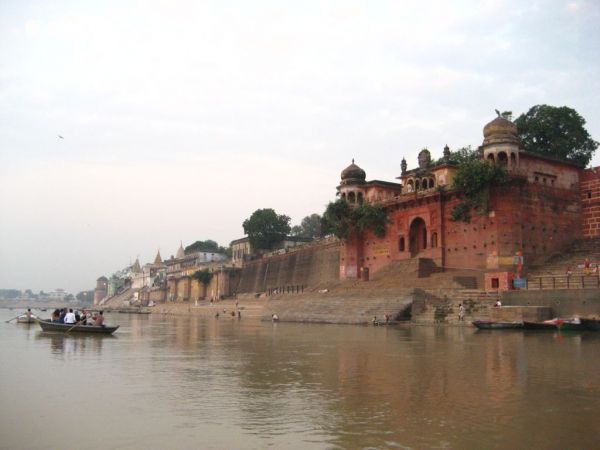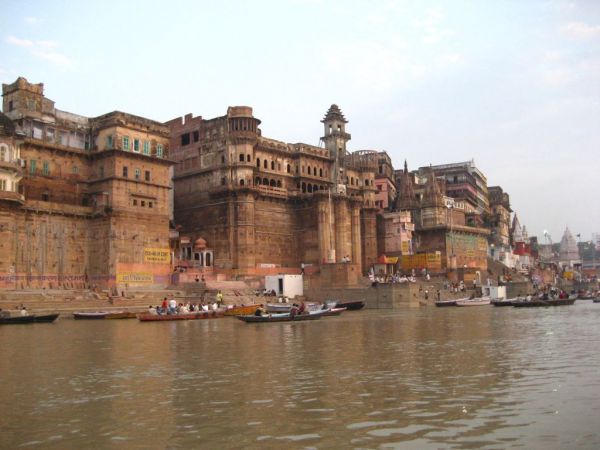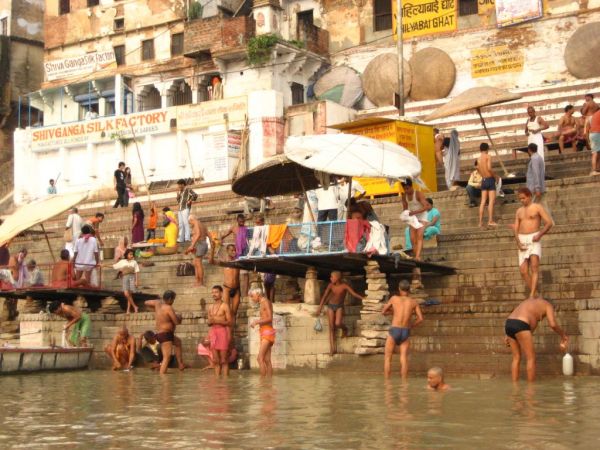The Ganges takes the shape of a crescent. One bank abandoned to the nature, one bank dedicated to the religious fervour.
Varanasi, bathed by the sacred river of the Hinduism and its followers' fervour.
Enjoying a sunrise over the holy city from a small boat drifting on the waters, and you'll surely feel this sensation that overloads your senses, this religious tradition which pierces you to the sound of the morning prayers and at the pace of the ancestral rites several generations of Hindu people perpetuate coming to purify and revitalize themselves into the river.
The bank is a string of ghats, stone stairways arise in the parallel alleyways of the river and vanish below into the holy waters. 5h30, in the coolness of the dawn, we go down a few steps and sit down in a wooden boat. The gondolier pushes off the bank and we start sailing on the waters reflecting the glow of the dawn. A cathedral silent in this Hindu open-air temple. The sun rises beyond the pristine bank and lights the polychrome façades of the opposite bank. We "swim" in this scenery up to be intoxicating. Our digital cameras immortalize these moments of life. Thousands of pilgrims give to each one of these moments a unique and unforgetable feature. An ochre and saffron postcard.
























Keyword - chromatic vertigo -
Saturday 13 October 2007
Hindu fervour by the Ganges river
By dorian on Saturday 13 October 2007, 22:06 - RTW-India
Sunday 23 September 2007
Perched on the Kinnaur valley
By dorian on Sunday 23 September 2007, 17:25 - RTW-India
A white 4x4, Cashmiri guide and driver, an Australian pictures hunter who wanders about the world for 30 years, a young Swedish girl who has courageously chosen India as her first country, a Canadian lumberjack, untiring traveler, and a little French guy that decided to go round the world 3 months ago. An eclectic team and a 10-day communal life in the close future.
We leave Shimla for a long journey by jeep. The discussion starts in the close space of the vehicle. We learn from each other.
The cultures diversity enriches.
The winding road raises into a nascent valley. The misty veil glides onto the hills and wraps the silent nature up. We stop for a stroll in the forest marked out by a Hindu temple at the top. No breathtaking view, nasty clouds weaves a thick fence. Only just a bench to get our breath back and share a chocolate bar.






We start again. The chats carries on. Laughs. Travel experiences. Pieces of advice on next destinations. The frustrating feeling of an unknown chunk in the world. We bring it to mind, we use a few superlatives, we make dream the audience, and this place, utterly absent in my mind, adds up to the list of things to see. More we travel, more places to visit. An endless wheel, traveling makes and unmakes you. On the bumpy Indian roads, we deal with the bears and the salmon fishing into the rivers of Alaska. The visit of the Hanuman temple drags us out of the jeep. A Disneyland-like statue of the monkey-god invites vehicles to stop and spend some moments in silence.



We arrive in Sarahan. The darkness-blackened roofs of the temple announce a great visit for tomorrow morning. We sit down at a small restaurant. The cracked paint, canteen tables, bashed-in saucepan. A Nepali family runs the restaurant and in this only 10-m² room, the comfort of a familial meal, we feel at home.

Hectic awakening. No time to linger, we start tracking the large spiders which invaded the room, a bucket and a bowl as weapons. Then, we take a savoury breakfast and we relate our morning feats.
We leave to visit the temple. Exquisite wood-carved pediments, a hindu ceremony and a carmine tikka on the forehead.





We keep on visiting around the village and it's time to go. On the flank of the road, a cow struggles with a plastic box clung to its head.
The valley subsides. The breathtaking road, carved into the cliff at several hundreds meters high from the ground livens up when multicoloured trucks meet. Wing mirrors bang together. Driving back is sometimes the only solution and the jeep waits close to the void. It goes again on the close turns, pushing down the horn to warn the other vehicles. A dangerously high road that gives thrills to the passengers sitting along the precipice.
A valley with Himalayan dimensions.
The roads bleed the hill white that landslides wreck. Months of works to rebuild the missing parts. An unsuspected activity livens our aerial road when a herd of sheep makes a traffic jam or when a baba sadhu gives candies to the tired drivers and passengers.










We spend 2 nights in Sangla. A wooden temple overlooks the village. We must take off the shoes, don a hat and fasten a belt to get in the old monument.
Clumsy alleyways, purple, azure orchards and flower beds.
The apple trees are weighed down with the red fruits. In the depths of the village, houses with bare or whitewashed harbour a few Tibetan Buddhist souls in exile.









The visit of Sangla is interrupted by an excursion to the village of Chitkul, last village before the Tibetan border. At the wintertime, snowfalls may cut the access to the village. Then, this one lives in autarky, forgotten by the faraway civilization. Biting cold, far from the blazing sun of the Delhi basin.








Tomato omlette, toats with tasteless jam and black tea. En route to Kalpa. Rucksacks piled up in the back of the car, some handlings to get out of the narrow path of the guesthouse, we leave again. The asphalted strip starts again its twirling danse into the wounded cliff while the river below seems to be a mere stream. A dizzy spell strikes me as I size up the turquoise-blue ribbon down the valley. The ballet of the adorned trucks terrifies us, each turn is a trial. We chat to forget the void. A few stops to take photos.
The "Kalpa" sign announces the end of the stage. Here, the marijuana grows like the weed. And the apple trees bend with the weight of their loads. In the distance, the headland of the Kinnaur Kailash makes some bashful appearances through the clouds. In good weather, it lights up with 7 seven different colors throughout the day. Kalpa, another village clung to the slopes of a hill which lives difficult moments when the wind sweeps over the area.










A new day, the road keeps on raising. Dry nature, inhospitable nature. Bushes gush out here and there. The human paw inlaid some ramshackle and insignificant buildings in the earthy titan. The road zigzags on the steep slopes and vanishes at the entrance of Nako. Below the hills, a tiny lake soaks up a few souls who gathered to struggle better. The Himalayan scenery as the only comfort of this hard life. For us, we gorge ourselves on these impressions, these smiles, these wind-stroked stones, these fringes-worn flags fluttering at the top of a mound, these cubic and uneven houses. Where is the madness of the Indian cities ? The horns of the rickshaws and the crawling poverty on the pavements ? Hard to believe we'll still in India. However, that's this diversity which attracts flocks of tourists, far from the hackneyed routes. A simple journey by train and the ecstasy of a bit of greenery clears away the nervous breakdown and the unease of a seething town. We feel well here.












Sunday 26 August 2007
Back onto the Great Wall
By dorian on Sunday 26 August 2007, 13:11 - RTW-China
We can't leave China without seeing and talking again about its symbol. France has the Eiffel tower and China has the Great Wall. The day before yesterday and with the family, I went back hiking from Jinshanling to Simatai. superb views in a clement weather and intact emotions.

















Today, let's give way to the secret wall. One of these several parts, impossible to describe in a travel guidebook, and which delight some Chinese people sensing the good opportunity to make money. An alternative to escape from the tourists who swarm into the rebuilt sections of the Beijing-surrounding Great Wall. A short walk goes through the wood and ends at the bottom of the wall.
This enigmatic blend between an ancient human building and the vegetation which takes back the bit of land that formerly belonged to it. We feel the sensations of these treasure hunters and other archaeologists of the last centuries, crazy enough to leave the comfort of the city, guided by the obsessive quest of new jewels and unknown lands. We marvel like these intrepid pioneers. The steep hill sides would have formed a natural fence but topping its ridge with this wall, man showed his intention to tame the nature, to show his superiority over it. For a period. Because time teaches us without a meticulous maintenance, the nature swallows everything, destroys this fabulous rampart and devours the stone.
The so dreaded invasion didn't come from the humans but from the earth. Over the years, the roots pushed the rock away, infiltrated between the paving stone to finally dissociated and buried them. The fruits of the nature creep onto the rock and we contemplate this struggle that vanishes in a sumptuous intertwining of colors and forms.










« previous entries - page 8 of 12 - next entries »




